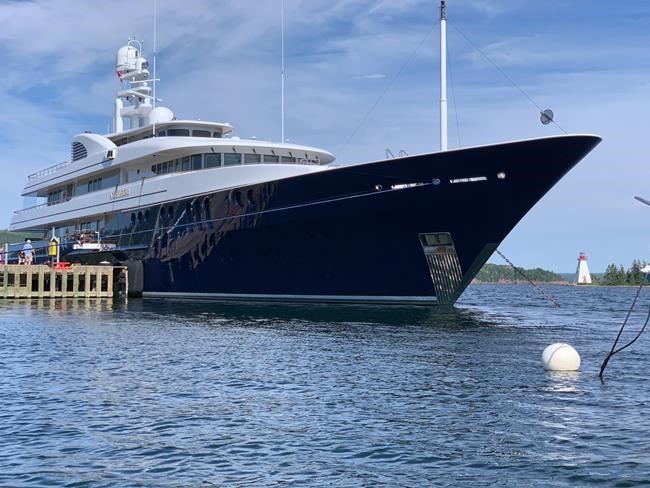
With memories of the tar ponds receding, the port city of Sydney, N.S., is now trying to cultivate an upscale vibe — one that includes appealing to billionaires and their toys. The superyacht M/Y Archimedes is seen docked at the public wharf in Baddeck, N.S., in a summer 2022 handout photo. Destination Cape Breton has hired Superyacht East Coast, based in Halifax, to attract to the island those who own boats like Archimedes, a 68-metre superyacht believed to be worth about $100 million. THE CANADIAN PRESS/HO-Superyacht East Coast, *MANDATORY CREDIT*
January 01, 2024 - 4:00 AM
HALIFAX - Not so long ago, the largest community in Cape Breton was best known as home to one of the most toxic waste sites in North America: the infamous Sydney tar ponds.
Containing one million tonnes of oozing sewage and industrial sludge — left behind after centuries of steelmaking — the site has since been capped with concrete and transformed into a sprawling urban park that opened 10 years ago.
"It's a transformation from what was an industrial economy to one that is more service-based with tech businesses and education, ” says Terry Smith, CEO of Destination Cape Breton, the island’s tourism marketing organization.
With memories of the tar ponds receding, the port city is now trying to cultivate an upscale vibe — one that includes appealing to billionaires and their toys. It wants to become a destination for superyachts, the most expensive, luxurious boats in the world, which have become the ultimate status symbol for A-list celebrities, dot-com titans and lesser-known oligarchs.
Destination Cape Breton has hired Superyacht East Coast, based in Halifax, to attract to the island those who own boats like Archimedes, a 68-metre superyacht believed to be worth about $100 million. According to Superyachts.com, the vessel — as long as a 20-storey building is tall — has a marble Jacuzzi, a grand piano, an enclosed gym, a wood-burning fireplace and six staterooms.
Compared to some superyachts, which boast helicopter hangars and glass elevators, Archimedes is considered an understated boat.
Owned by U.S. hedge fund billionaire James Simons, the vessel spent at least a week last summer in Cape Breton, moored at the community wharf in Baddeck, N.S., where it caused quite a stir among the locals.
"The larger yachts are the ones that people tend to gravitate to," said Adam Langley, president and CEO of Superyacht East Coast. "They come alongside, and suddenly there's hundreds of people around buying ice cream or lunch and taking in the environment that these boats create."
And the economic benefits don't end there, Langley said. The owners of these floating mansions typically spend a small fortune on provisions after they arrive in port.
Once Archimedes had completed its eight-week tour of Canada's East Coast, the captain told Saltscapes magazine that its owner had spent US$400,000 on fuel, groceries, tours, guides and entertainment.
"Think of them as large, floating resorts," Langley said in a recent interview. "They'll spend thousands of dollars on things like flowers."
But Tom Urbaniak says there needs to be a broader discussion about using public funds to attract superyachts to the East Coast.
"What this is really about is marketing to an infinitesimally small group of oligarchs, the uber-rich, hyper-celebrities and the people who swoon around them," said Urbaniak, professor of political science and director of the Tompkins Institute at Cape Breton University in Sydney.
"This is not just a celebration of wealth. This is a celebration of almost unimaginable excess."
The professor says that at a time when Canadians are being asked to make sacrifices to deal with climate change, it doesn't make sense to cater to rich people who flaunt their wealth in vessels that leave a massive carbon footprint.
"I haven't seen anything from Destination Cape Breton that there will be some kind of standard set to determine which ones get welcomed based on whether they pay taxes .... and whether they subscribe to the rule of law," Urbaniak said.
Smith says attracting superyachts is a small part of a broader strategy aimed at getting more boaters to come to the region. And he challenged the argument that superyacht owners represent the worst kind of polluters.
"I don't agree with that," said Smith, whose non-profit organization gets most of its budget from a levy charged to those who pay for accommodations in Cape Breton, as well the provincial and federal governments. "There are electric superyachts now. I think we're going to see a transformation in them in terms of cleaner fuels and cleaner ways of operating."
As for courting oligarchs, Langley says they're not coming to Atlantic Canada anyway.
"We see more explorer yachts that are not the huge, 600- and 400-foot superyachts," he said, adding that superyacht builders are now keen on using hydrogen technology to propel their boats.
"These are usually 200 feet and less, and they're usually owned by people who are very sensitive to where they are going and operated by captains who are respectful (of the environment)."
Meanwhile, Langley says he's working on a marine tourism strategy for Nova Scotia that will include sections on sustainability and best practices for marinas and waterfronts.
"I am very sensitive to that," he said. "I grew up in Nova Scotia along the Northumberland Strait and I'm lucky enough to have a place in Baddeck .... These places are very special."
This report by The Canadian Press was first published Jan. 1, 2024.
News from © The Canadian Press, 2024